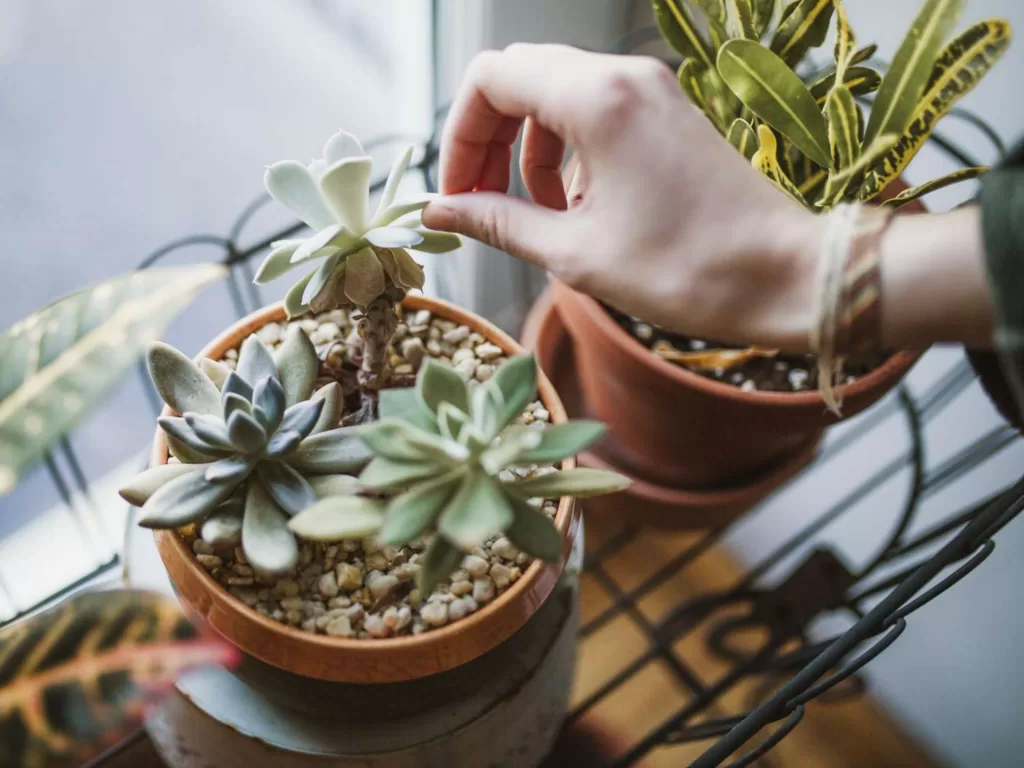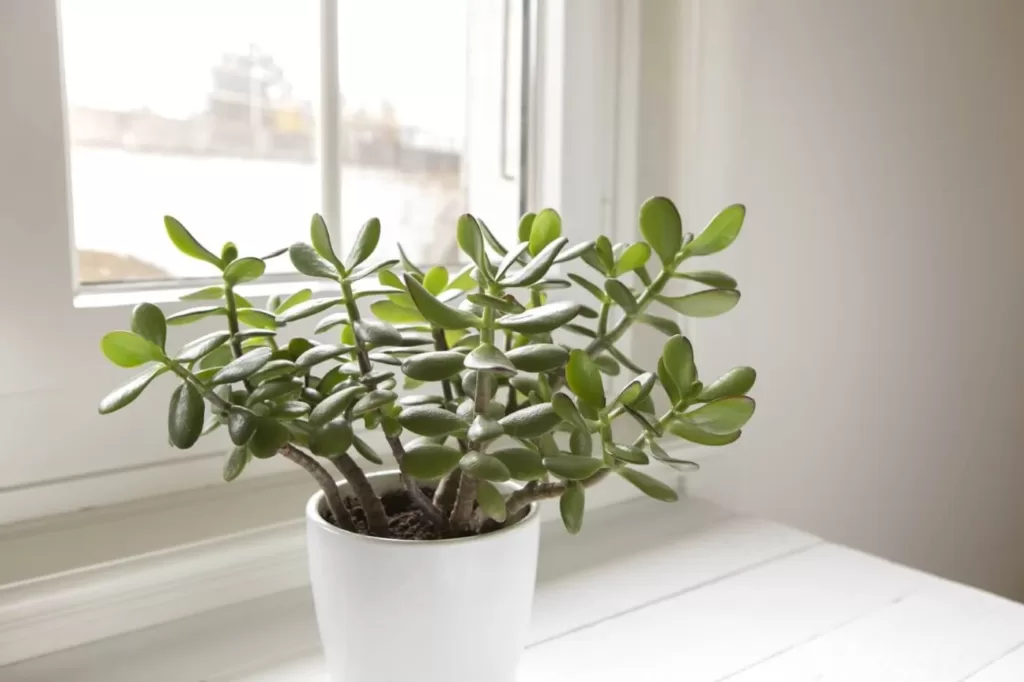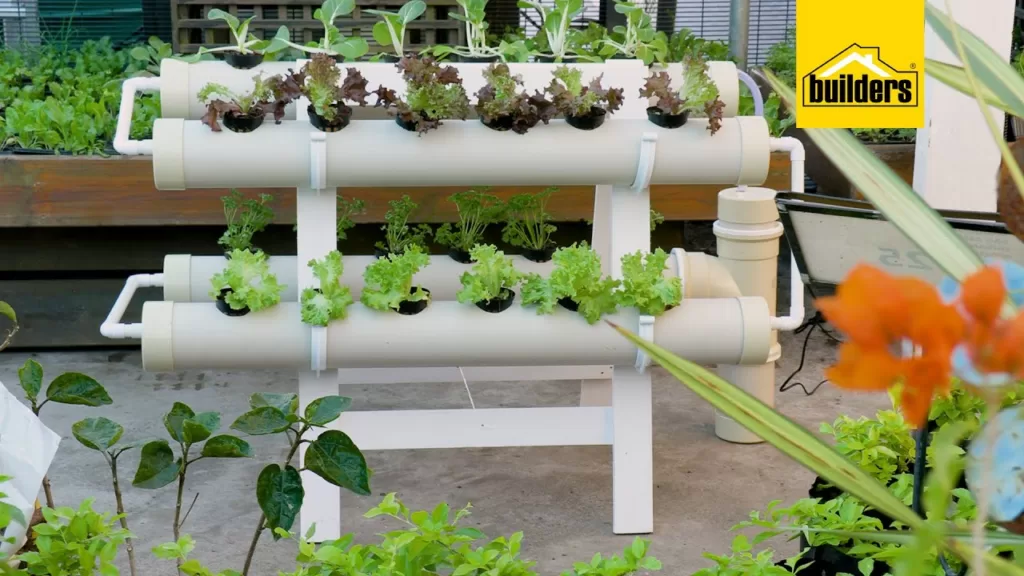Succulents prefer well-draining soil and infrequent watering. Tap water can contain minerals that can build up in the soil and harm the plants. It’s best to use filtered or distilled water, or water that has been left out overnight to allow chlorine to evaporate. Additionally, it’s important to make sure the soil is completely dry before watering again, as succulents are susceptible to root rot.
Table of Contents
Are succulents happier inside or outside?
Succulents can be happy both inside and outside. However, they are native to arid regions and are adapted to thrive in hot, dry conditions with plenty of sunlight. If grown outside in a suitable climate, they can receive the bright, direct light they need to thrive. However, they can also do well indoors as long as they are placed near a sunny window or under grow lights and are not overwatered. It is important to note that certain species of succulents are not cold hardy and should be brought indoors before the first frost.

What is the luckiest plant?
Different cultures and traditions have different beliefs about which plants are considered lucky. Some popular plants that are believed to bring good luck include:
- Bamboo: It is believed to bring good luck and prosperity in Chinese culture. -Money tree: Also known as Pachira aquatica, it is believed to bring good luck and prosperity. -Lucky bamboo: a species of Dracaena which is often used in feng shui and is believed to bring good luck and prosperity. -Jade plant: Also known as the “money tree” or “dollar plant”, it is believed to bring good luck and prosperity. -Palm tree: It is believed to bring good luck and prosperity in some cultures. -Pine tree: It is believed to bring good luck and prosperity in some cultures. -Cactus: It is believed to bring good luck and prosperity in some cultures.
It’s worth noting that having a plant in your home can have many benefits such as purifying the air, reducing stress and improving mental health. It’s important to take care of the plants and enjoy them rather than just considering them as a lucky charm.
What are the most poisonous house plants?
Some common house plants can be toxic if ingested. Some of the most poisonous house plants include:
-Dieffenbachia: Also known as dumbcane, it can cause burning and swelling of the mouth and throat, difficulty swallowing, and even temporary loss of voice.
-Philodendron: This popular house plant can cause burning and swelling of the mouth and throat, difficulty swallowing, and even temporary loss of voice.
-Elephant ear: This plant can cause burning and swelling of the mouth and throat, difficulty swallowing, and even temporary loss of voice.
-Oleander: All parts of this plant are toxic and can cause severe symptoms if ingested, including nausea, vomiting, and even death.
-Sago Palm: All parts of this plant are toxic and can cause liver failure if ingested.
-Caladium: This plant can cause burning and swelling of the mouth and throat, difficulty swallowing, and even temporary loss of voice.
-Cyclamen: This plant can cause stomach upset, vomiting, and even death if ingested.
It’s important to be aware of the potential hazards of any plants you keep in your home, especially if you have children or pets. Keep these plants out of reach and make sure to properly educate yourself on the plants you own, before bringing it home.
Is it good to have plants in bedroom?
Having plants in the bedroom can have several benefits.
-Plants can improve air quality by absorbing carbon dioxide and releasing oxygen, especially during the night, helping to improve sleep.
-Plants can also help to reduce stress and anxiety and improve overall mood, which can help you to relax and sleep better.
-Plants also act as natural humidifiers, which can help to keep the air in your bedroom moist and comfortable, which can be especially beneficial during the dry winter months.
-A study found that certain plants can even help to reduce noise levels, which can be beneficial for people who live in busy or noisy areas.
However, it’s important to keep in mind that not all plants are suitable for the bedroom. Some plants, such as succulents, cacti, and snake plants, release oxygen during the night, which makes them ideal to keep in a bedroom. Other plants like spider plant, peace lily, snake plant, and aloe vera are known to improve air quality by absorbing toxins like formaldehyde, benzene and trichloroethylene.
It’s also important to note that some plants can be toxic and may cause allergic reactions. It’s a good idea to do your research and choose plants that are safe to have in the bedroom.

Does Tulsi produce oxygen at night?
Tulsi, also known as Holy Basil, is a common houseplant and a popular herb in Ayurvedic medicine. While many plants release oxygen during the day and take in carbon dioxide during the process of photosynthesis, they will consume oxygen and release carbon dioxide during the night. Tulsi plant is an exception, it is known to release oxygen during the night time and is considered to be one of the best air-purifying plants. This makes it an ideal plant to have in a bedroom or other areas where people spend a lot of time, especially at night. This property of tulsi is because of the fact that it has a unique ability to absorb carbon dioxide and release oxygen during the night, which makes it an ideal plant to have in a bedroom or other areas where people spend a lot of time, especially at night.
It’s worth noting that in addition to its air-purifying properties, tulsi is also considered to have many health benefits, including reducing stress and anxiety, improving digestion, and helping to boost the immune system.
Is succulent plant good for Vastu?
Vastu Shastra is an ancient Indian system of architecture and design that incorporates elements of traditional Hindu beliefs about the natural world and the effects of cosmic energy on human life. It can be used to design and decorate homes, offices, and other spaces.
Succulent plants are considered auspicious as per Vastu Shastra and are believed to bring positive energy into a space. They are also considered to bring good luck, prosperity, and wealth. Succulents are said to be good for the North and North-East directions of a house. They can also be placed in the living room, office, or any other place where people spend a lot of time.
It’s worth noting that succulents are easy to care for and require very little attention, making them an ideal plant for people who are not particularly skilled at gardening. They also require very little water and can thrive in a range of different lighting conditions.
It’s important to note that Vastu Shastra is just one of the many ways to approach the design and decoration of a space, and not everyone believes in it. It’s always good to have plants in the house, as they have many benefits for our physical and mental health. It’s important to choose the plants that suit the place and the environment and to take care of them properly.





